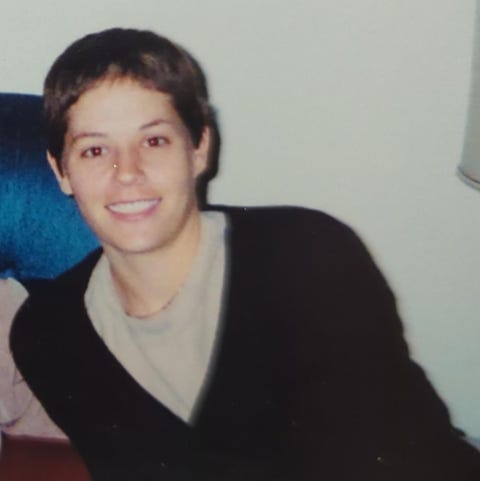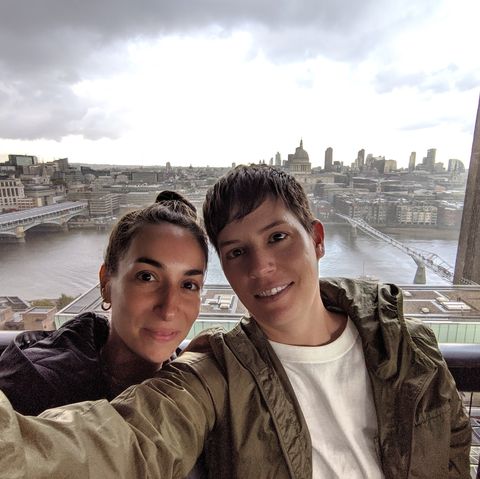The warmth began on my neck, just below my ears, and moved slowly upward. Soon, heat emanated from my scalp as if I’d eaten a hot pepper. My face flushed — I couldn’t see it, but I could feel it. The backs of my hands moistened with sweat. My entire body felt oddly, uncomfortably and suddenly very warm.
If you’re a “woman of a certain age,” you’ll recognize the tell-tale signs of a hot flash. But I was 24 and not quite sure what was going on. It was just one of many unexpected things happening to my body around that time, and by then, I was kind of taking it day by day.
Months before my first hot flash, I’d been feeling unusually bloated and crampy. At times, I felt a sharp pain on the right side of my abdomen. Just two years removed from playing competitive college soccer, I was now too uncomfortable for even a slow jog. One doctor diagnosed me with IBS; another thought I had a UTI. None of them seemed all that concerned. I was, however. After a morning of particularly bothersome abdominal pain and built up frustration, I went to urgent care. A doctor there performed an ultrasound, diagnosed me with ovarian cysts and prescribed birth control.
Three months later, I was due at my gynecologist’s office for a follow-up for the ovarian cyst diagnosis. I told her about my experience — I still felt bloated and had no appetite, and the birth control hadn’t done much that I could tell — and she shuffled me into an exam room for another ultrasound.
Afterward, she explained that I had a large “mass” in my abdomen, enveloping my ovaries— no doubt the cause of my symptoms. At first, I felt a strange sense of relief. Finally, someone acknowledged that something was wrong. But when she looped in an oncologist “as a precaution,” relief shifted mostly to denial. Surely it’s nothing.
Just three days later, doctors removed the mass (the size of a mini Nerf football, I was told), both ovaries and my appendix, which had unfortunately gotten mixed up in it all. I was diagnosed with Stage IV ovarian cancer.
Going into early, surgical menopause
So that’s how I found myself, well before I owned a decent set of dishes, in menopause. That hot flash was, I figured out, a symptom of menopause, which I had been put in surgically with the removal of my ovaries. My diagnosis was downgraded to stage I, but doctors nonetheless detected “a shadow” on a follow-up scan a few months later, and I had a total hysterectomy to remove my uterus, fallopian tubes and cervix.
Like many women in menopause (who are, of course, typically in their late 40s and 50s) my symptoms were all over the map. I wasn’t sleeping well, mostly because of night sweats, and I had a random period, which is rare but not unheard of after a double oophorectomy. I went on a few completely arbitrary and out-of-character crying jags. Maybe it was my roiling hormones or a release of the emotions — shock, grief, anger — I’d tamped down over the previous months (or a little of both), but suddenly I’d be overcome.
Granted, menopause wasn’t as bad as, say, the chance of the cancer coming back. Plus, there was a lot to be grateful for – especially my job with benefits. Not many 24-year-olds are so lucky. But still. It was a lot.
During that time, my primary support system consisted of my girlfriend and a good friend. But what did we know about menopause, cancer, chemotherapy, fear of recurrence, loss, death? We were all in our 20s — caregiving wasn’t really a skill anyone had acquired and I didn’t know how to anticipate or ask for what I needed. However, there was one task we knew we could handle and it involved my friend’s boyfriend’s electric razor. About a week into chemo, my shoulder-length hair began to fall out. So one sunny Sunday, the three of us moved the dining room furniture out of the way, set up a “barber chair” in the middle of the room and buzzed my hair. I went to the bathroom to check out the results, expecting a “hear me roar” G.I. Jane moment. But I was pale, my eyes dim, my hair patchy. I was still sick, but now I had much shorter hair.
The body I thought I knew
Menopause and cancer at 24 was a lesson in accepting a body I thought I knew, a body that had been a source of power and identity and possibility. During my parents’ divorce when I was 12 and through the difficult years that followed, I practiced soccer for hours, often alone, honing my body and calming my mind, sweat as distraction. In college, I was an athlete first, everything else a distant second. After college, I started running, biking, hiking — anything outside and active was my happy place.
But after my surgeries, through a few months of chemotherapy and recovery, my muscles and fitness level dwindled, I lost my hair, I stopped having a period, hot flashes began, I was nursing a 7-inch scar down the middle of my stomach. My body had morphed from powerful to, I felt, a bit pathetic.
My years’ long relationship with my girlfriend, too, frayed around the edges. Sickness and surgery aren’t exactly a love language and each of us were pushed to our emotional and physical limits. Still, my partner stuck with me, shopping for Ensure when I couldn’t eat much else, spending many a Friday night on the couch for a movie marathon, endlessly putting my needs ahead of her own.
What I lost, what I gained
Luckily, in the year after my chemo ended, my hair grew back, as did my muscles. I took up sprint triathlons and joined an adult soccer team. My doctor and I got the hot flashes and night sweats under control with hormone therapy, which I’ll continue for the rest of my life. My partner and I broke up a few years later, which was hard. Our separation felt more like the dissolution of a marriage considering everything we’d been through together.
In some ways, my particular series of losses — ovaries, hair, uterus, period, fertility — kicked off a decades’ long exploration of gender, which has led me to rethink, in some ways, what it means to be female. Many people, even without realizing it, still carry a set of expectations for and assumptions about women – they should look a certain way, be sensitive and deferential, embrace and exercise their fertility. Misogyny runs deep; our culture, with its nearly endless examples of physical and psychological violence against women, reinforces it every day.
One thing my menopause experience has done for me is to make my definition of gender more expansive, with no label feeling just right to define who I am. Fertility or none, short hair or long, strong or weak, I’m just me.
A fertile future
I’m 43 now, and looking back, I can’t say that I had a particular vision of the future. My then-partner and I hadn’t really discussed children — we’d barely discussed graduate school. So when my oncologist briefed me before the first surgery that removal of my ovaries would mean I couldn’t get pregnant, I hardly gave it a second thought. One of the fortunate aspects of having a female partner is that there’s usually another uterus available. Besides, did I even want children? I just didn’t know.
At 24, before menopause, I suppose I had certain assumptions about the kind of life that might be available to me, or at least not not available to me — biological children and all that comes with them. But even if I had known I wanted kids for sure, it wouldn’t have mattered much. In 2004, at the time of my surgeries, egg freezing was years away from becoming routine. I couldn’t have afforded it anyway. Have I come to peace with not having biological children? Is it accurate to say you’ve come to peace with something that you didn’t fully consider before the option disappeared? Let’s just say I’ve accepted my reality.
At the end of the day, I think I’ll try to live up to the essence of the word “fertile,” which comes from the Latin fertilis, meaning bearing in abundance, fruitful, productive. The definition doesn’t specify what you bear in abundance. At the moment, my cup overflows with love and appreciation for my wife, my work, my health. As for the rest, I’m content to just wait and see.
This content is created and maintained by a third party, and imported onto this page to help users provide their email addresses. You may be able to find more information about this and similar content at piano.io


